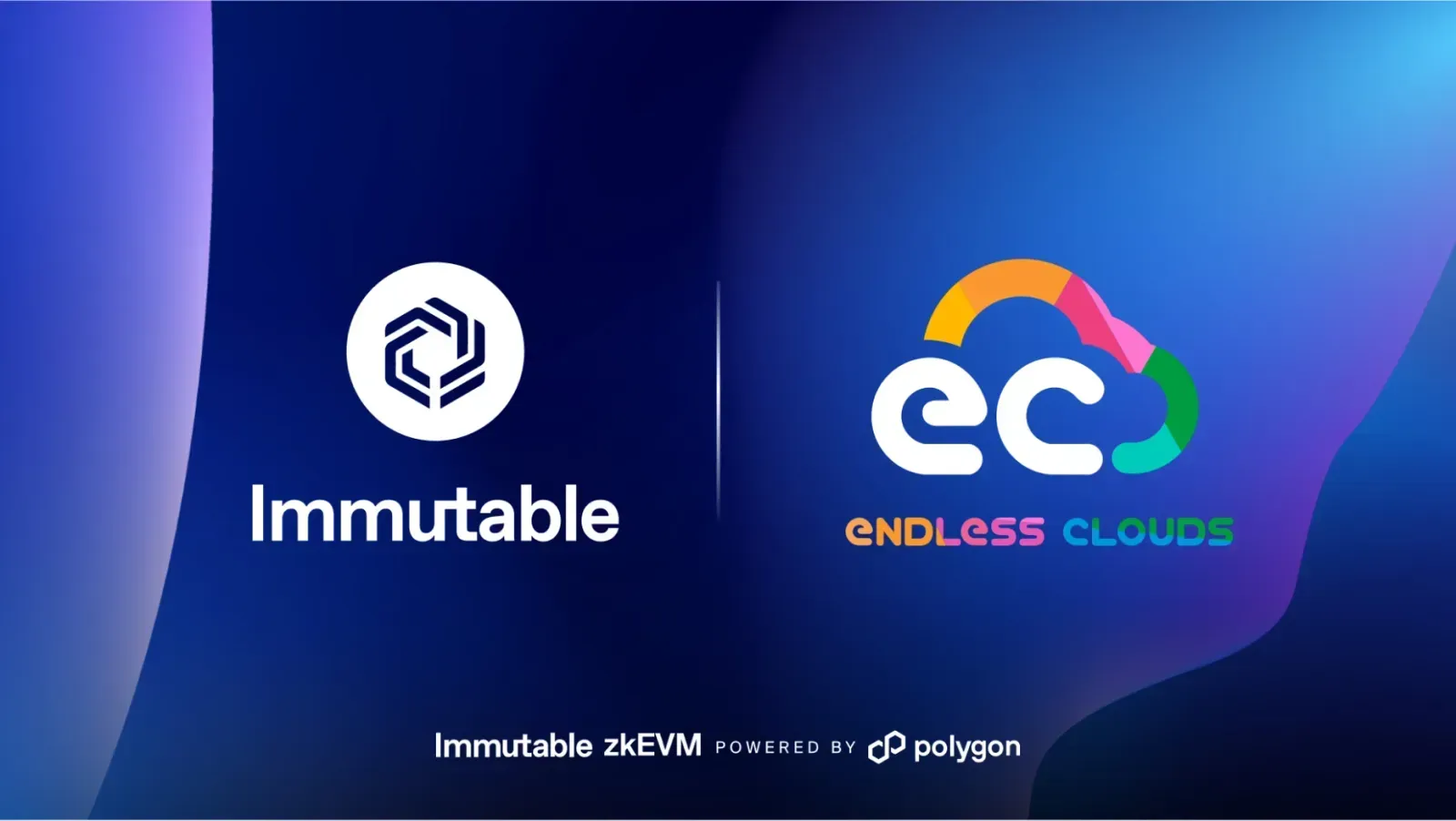As the gaming industry continues its rapid evolution, propelled by the promise of blockchain technology, developers and studios are increasingly drawn to the potential of decentralized platforms and web3 gaming experiences. With over 70% of major studios now actively engaged in developing web3 games or investing in blockchain-related ventures, the allure of this burgeoning sector is undeniable.
However, amidst the fervor for innovation and decentralization, a critical question emerges: Is it truly advantageous for gaming companies to construct their own infrastructure from scratch? In exploring this question, we uncover the untold risks and hidden costs associated with eschewing established solutions like Immutable and delve into why opting for in-house development may not always be the most prudent course of action.
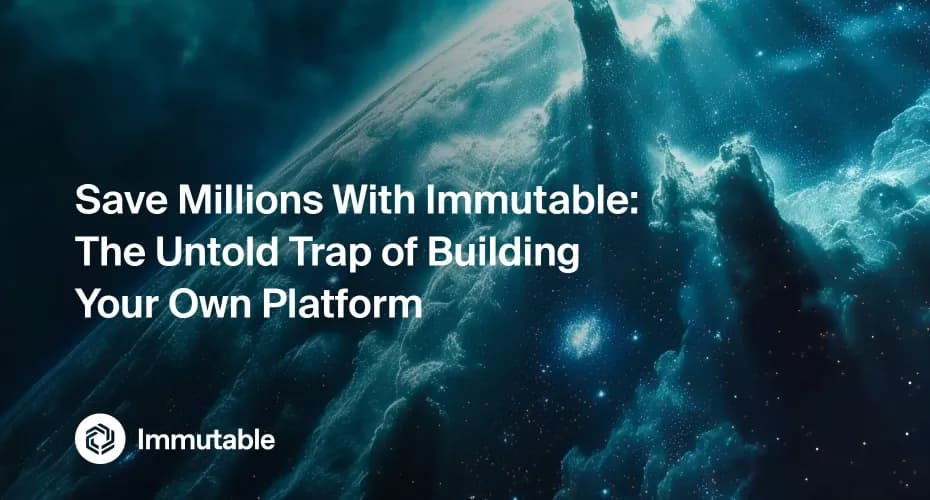
Saving Millions With Immutable
Building your own web3 gaming platform from scratch is undeniably an ambitious endeavor, one that often carries a hefty price tag. It's understandable why gaming studios may be tempted by the prospect; after all, who knows the intricacies of their game better than its creators?
However, the allure of complete control must be weighed against the stark reality of the immense resources required to bring such a vision to fruition. Selecting the appropriate blockchain, integrating various product components, and ensuring seamless functionality demand not only considerable time but also a significant financial investment.

Blockchain-Related Expenses
These resources, which could otherwise be allocated to enhancing gameplay and user experience, are diverted towards tackling a multitude of complex challenges inherent in constructing a web3 gaming platform from the ground up. From hiring specialized solidity engineers to auditing smart contracts and integrating with essential service providers, the list of essential tasks seems endless.
Moreover, ensuring regulatory compliance, incentivizing liquidity, and implementing robust security measures add further layers of complexity and expense. To illustrate the magnitude of these blockchain-related expenses, let's delve into a real-world example encountered by a game studio navigating the web3 landscape. Here’s an example of what all these blockchain expenses look like for a real game studio:
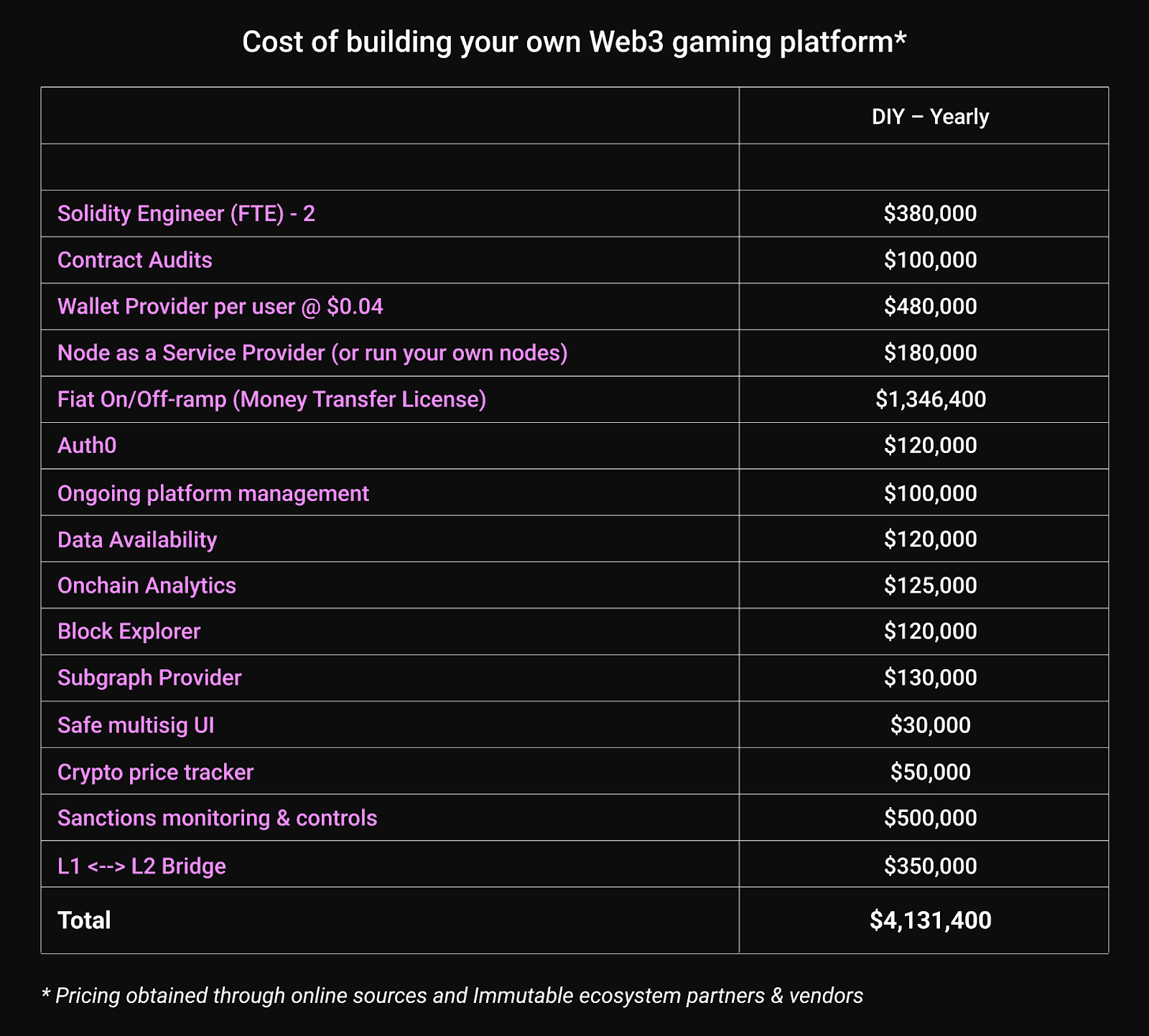
On-Chain Data Analytics
Indeed, the complexities inherent in developing a web3 gaming platform extend far beyond the essentials outlined previously. Beyond the foundational elements of blockchain integration lie a myriad of additional features essential for delivering a seamless and immersive gaming experience to players.
Implementing functionalities like a marketplace checkout system and on-chain data analytics further compounds the financial and temporal demands of the project. Much like the development of the game itself, the process of building blockchain infrastructure is prone to spiraling costs and timelines that often exceed initial projections.
This reality underscores the importance of carefully considering the trade-offs between building in-house and leveraging existing solutions, as well as the imperative of prioritizing resources to ensure both the viability of the platform and the quality of the gaming experience it delivers.
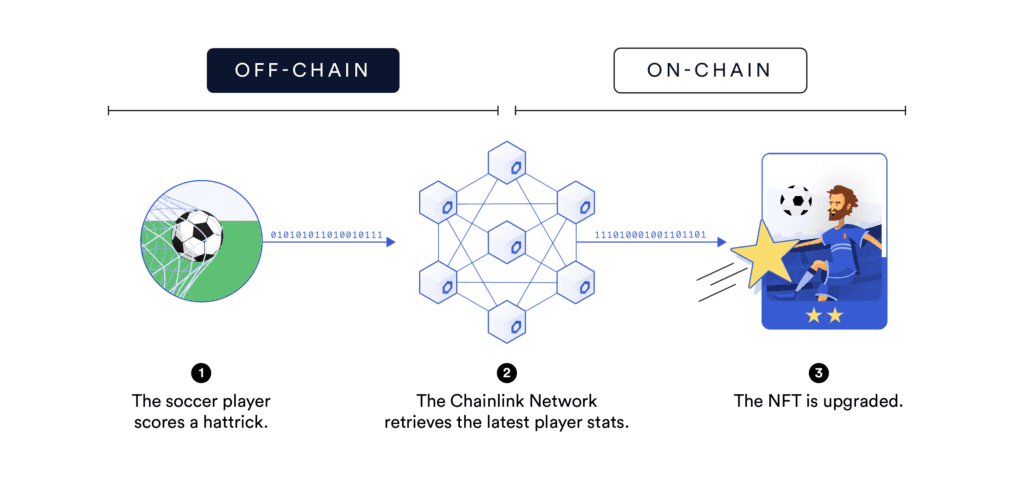
Maintaining Blockchain Infrastructure
Deploying and managing a proprietary blockchain infrastructure presents considerable operational challenges. Beyond the initial deployment phase, ongoing maintenance entails establishing and nurturing relationships with various third-party vendors, involving regular communication, documentation updates, and adapting to evolving dependencies.
The true challenge lies in sustaining functionality over time. The operational burden of overseeing a blockchain platform is an ongoing commitment, demanding both technical maintenance and compliance with regulatory changes. This dynamic landscape introduces risks that could undermine the success and durability of your gaming venture.
Funds, Transactions and Licenses
Moreover, if your operations involve holding user funds and facilitating peer-to-peer transactions, acquiring money transfer licenses becomes imperative across all jurisdictions where your game operates. The substantial expenses associated with this requirement, often underestimated by aspiring web3 game developers, not only entail significant financial outlay and complexity but also expose your venture to regulatory compliance challenges.
In essence, constructing your web3 gaming platform entails navigating through operational complexities and vulnerabilities, diverting focus from the core objective of crafting engaging gaming experiences.
Building On Immutable
Opting for Immutable significantly reduces both the expenses and risks involved in launching your web3 game, slashing costs by approximately 90% through our comprehensive end-to-end solution. With Immutable, the teams implement a flat 2% protocol fee on primary sales, offering substantial savings compared to the expenditures associated with independently constructing a platform. What does this entail for you? Quite a bit, as Immutable (IMX) services encompass a wide array of essential components necessary for building your web3 game from the ground up:
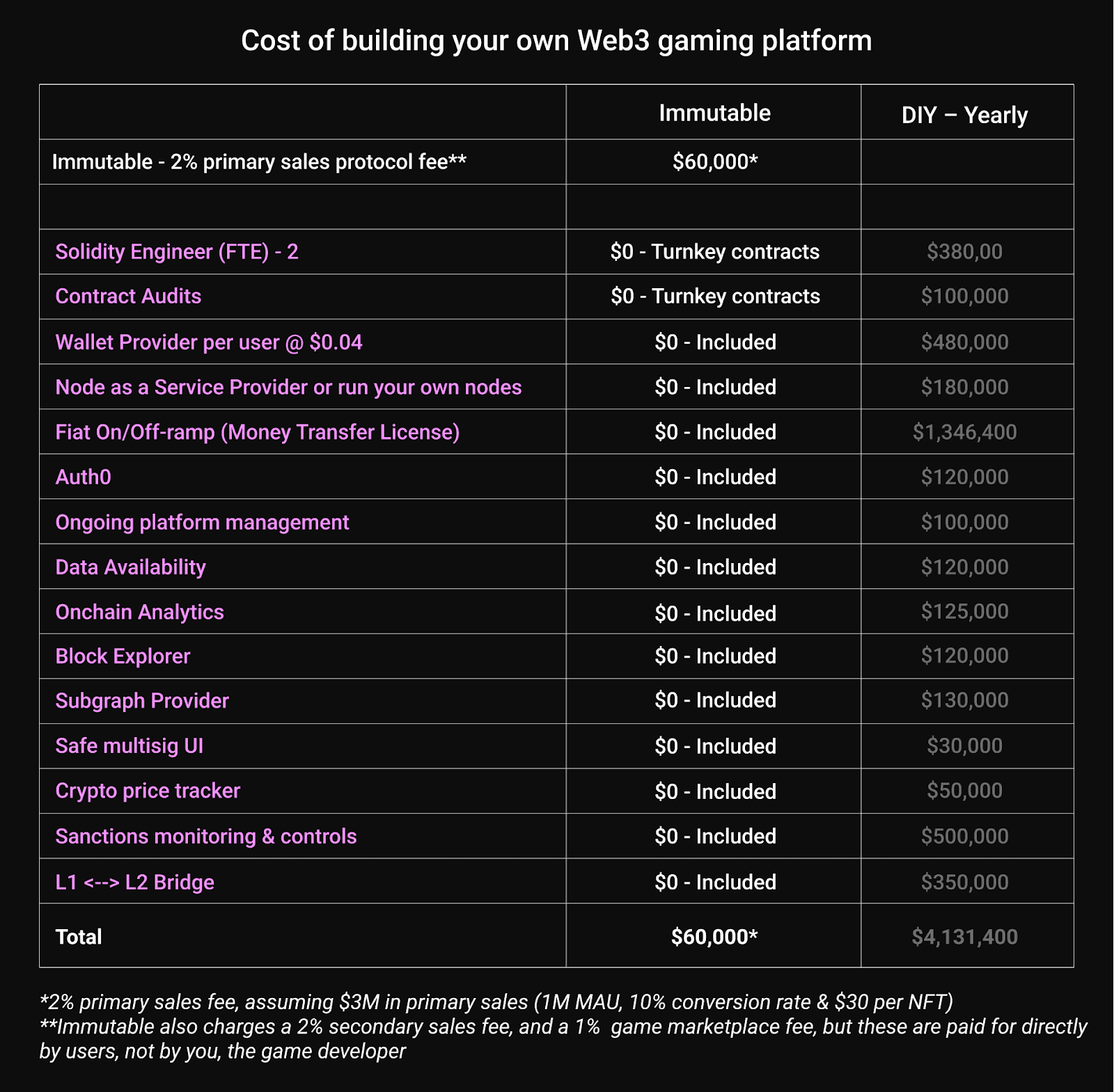
Furthermore, by selecting Immutable, you'll be leveraging industry-leading web3 gaming-focused blockchains. Whether you opt for Immutable X or Immutable zkEVM as the foundation for your game, rest assured that these platforms offer robust, secure, and scalable solutions capable of enduring over time.
If you choose Immutable, you will be part of the largest and fastest-growing web3 gaming ecosystem, with more than 220+ highly funded games using our technology stack. The company also boasts multiple industry-defining partnerships, such as Polygon, Ubisoft, Unity SDK, Amazon Web Services.
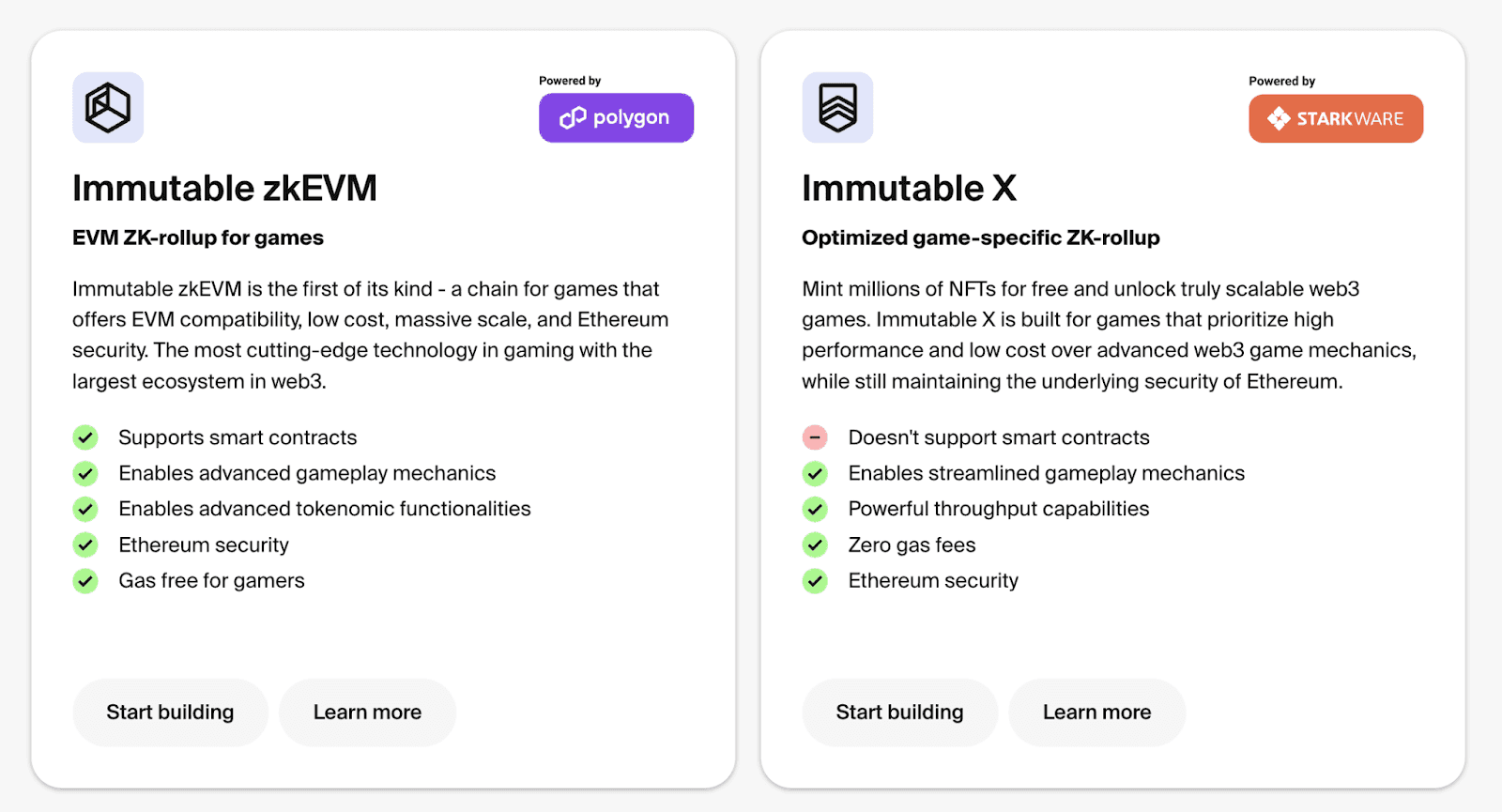
One of the most notable benefits of choosing Immutable is their ability to abstract away the technical intricacies of web3 game development. This enables studios to allocate their resources entirely to game design, without having to worry about navigating the complexities of blockchain technology.
Here’s how they do that:
- Smart contract templates: They have ready-to-deploy contracts that remove the need for in-house in-depth blockchain expertise.
- No-code solutions: They empower game developers to implement blockchain features without writing a single line of code.
- Limitless liquidity. With Immutable Orderbook and rewards on Immutable zkEVM, you don’t have to worry about bootstrapping liquidity from the ground up.
- Full Immutable product suite: An end-to-end web3 gaming platform that can deliver a seamless gaming experience to your players, from sign-up to checkout.
And they are so focused on delivering a seamless gaming experience to your players, that any games building on Immutable zkEVM will be gas-free for gamers.
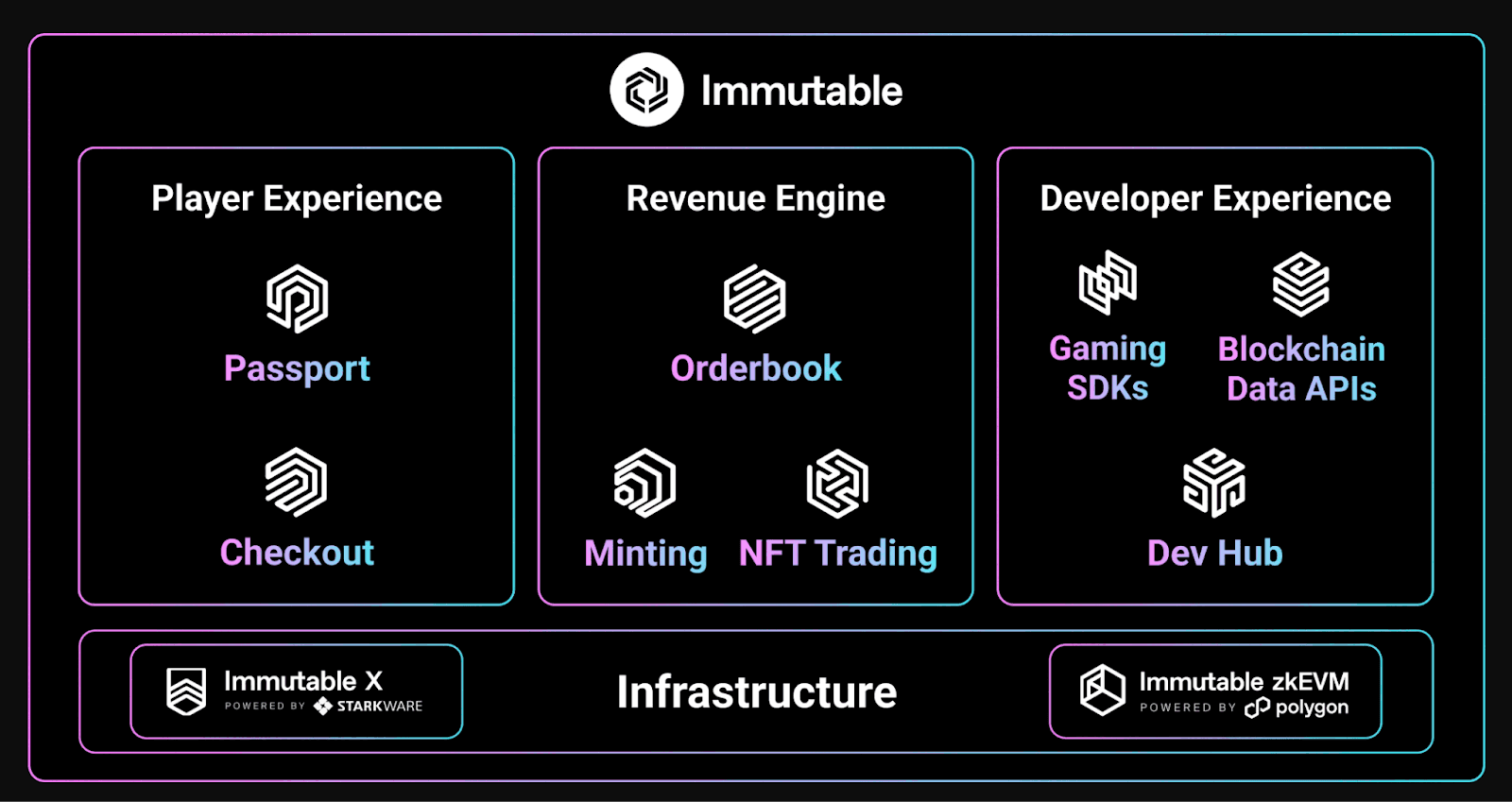
Lastly, as previously mentioned, web3 game development introduces a fresh set of regulatory hurdles that may appear daunting to game studios. Immutable relieves you of this burden by handling all requisite licensing obligations, ranging from money transfer licenses for peer-to-peer transactions to ensuring compliance with global regulations. Throughout the entire development journey, you'll only need to communicate with one entity: Immutable.
Final Thoughts
Constructing your own web3 gaming platform can be costly, risky, and divert crucial resources from game development. It's vital to prioritize what truly matters: crafting an exceptional game. The Immutable gaming platform simplifies the process for game studios and independent developers, enabling them to build and launch successful web3 games with confidence.
The Immutable product suite comprises pre-built solutions meticulously optimized for usability, empowering developers to expedite their entry into the market without compromising on security or player experience. Builders receive personalized web3 guidance, backed by live support for their communities, and gain access to the expansive ecosystem within gaming, boasting over 200+ games currently building on Immutable.
This article was inspired by an original blog post, you can read the original write-up here for more information.


